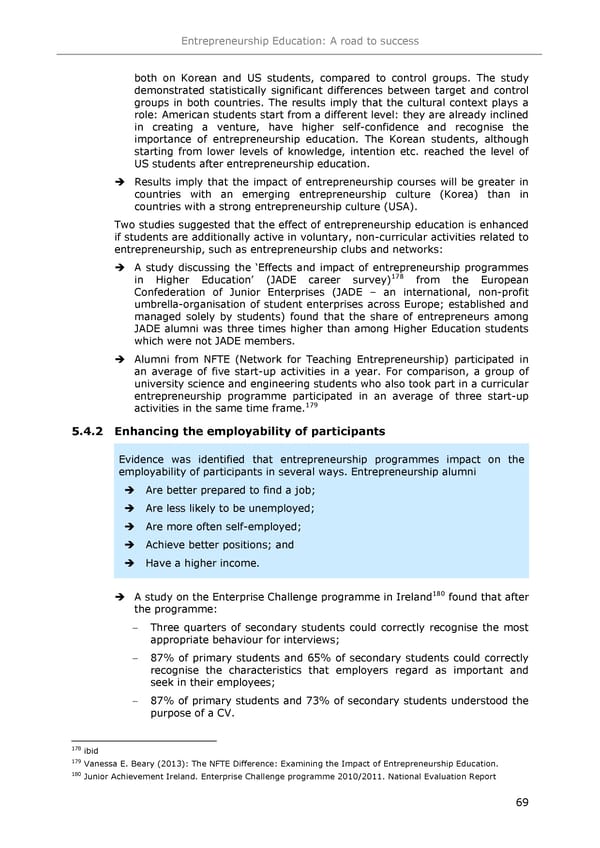Entrepreneurship Education: A road to success both on Korean and US students, compared to control groups. The study demonstrated statistically significant differences between target and control groups in both countries. The results imply that the cultural context plays a role: American students start from a different level: they are already inclined in creating a venture, have higher self-confidence and recognise the importance of entrepreneurship education. The Korean students, although starting from lower levels of knowledge, intention etc. reached the level of US students after entrepreneurship education. Results imply that the impact of entrepreneurship courses will be greater in countries with an emerging entrepreneurship culture (Korea) than in countries with a strong entrepreneurship culture (USA). Two studies suggested that the effect of entrepreneurship education is enhanced if students are additionally active in voluntary, non-curricular activities related to entrepreneurship, such as entrepreneurship clubs and networks: A study discussing the 8Effects and impact of entrepreneurship programmes 178 in Higher Education9 (JADE career survey) from the European Confederation of Junior Enterprises (JADE 3 an international, non-profit umbrella-organisation of student enterprises across Europe; established and managed solely by students) found that the share of entrepreneurs among JADE alumni was three times higher than among Higher Education students which were not JADE members. Alumni from NFTE (Network for Teaching Entrepreneurship) participated in an average of five start-up activities in a year. For comparison, a group of university science and engineering students who also took part in a curricular entrepreneurship programme participated in an average of three start-up 179 activities in the same time frame. 5.4.2 Enhancing the employability of participants Evidence was identified that entrepreneurship programmes impact on the employability of participants in several ways. Entrepreneurship alumni Are better prepared to find a job; Are less likely to be unemployed; Are more often self-employed; Achieve better positions; and Have a higher income. 180 A study on the Enterprise Challenge programme in Ireland found that after the programme: Three quarters of secondary students could correctly recognise the most appropriate behaviour for interviews; 87% of primary students and 65% of secondary students could correctly recognise the characteristics that employers regard as important and seek in their employees; 87% of primary students and 73% of secondary students understood the purpose of a CV. 178 ibid 179 Vanessa E. Beary (2013): The NFTE Difference: Examining the Impact of Entrepreneurship Education. 180 Junior Achievement Ireland. Enterprise Challenge programme 2010/2011. National Evaluation Report 69
 Entrepreneurship Education Page 72 Page 74
Entrepreneurship Education Page 72 Page 74